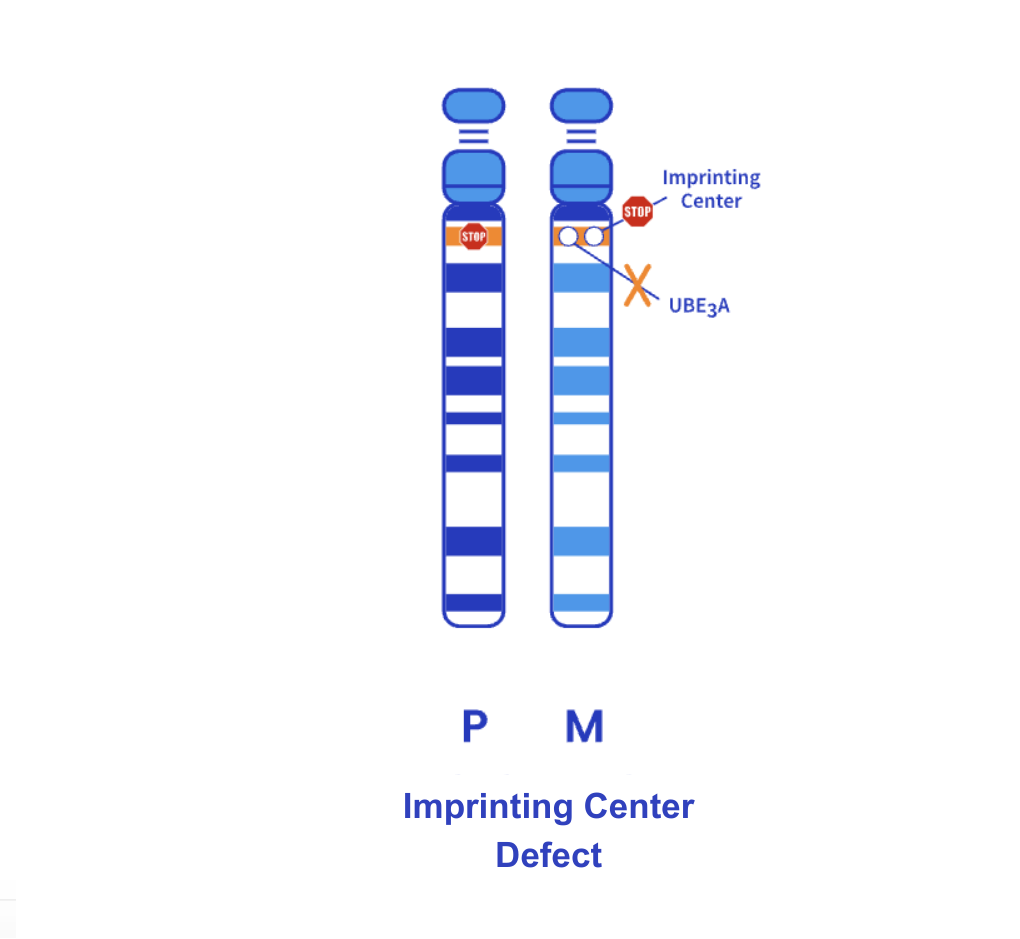About Angelman Syndrome
AS Genotypes: ICD
Some individuals living with AS have a lack of UBE3A as a result of an imprinting center defect (ICD). Typically, each person has one chromosome 15 from the egg (maternal) and one from the sperm (paternal). When we make eggs or sperm, we need to reset the chromosome 15's so that they have the correct imprinting-- we need all chromosome 15s coming from an egg to have the "maternal" imprinting and all 15's coming from the sperm to have the "paternal" imprinting. The imprinting center is responsible for the resetting of the imprinting.
When there is an ICD, the imprinting center doesn't work. Consequently, a chromosome 15 that the mother received from her father will still have "paternal" imprinting. As a result, the UBE3A gene is turned off on the maternal chromosome 15. Because the paternal UBE3A gene is always turned off in neurons, an ICD on the maternal chromosome 15 results in no UBE3A protein being made.
ICD is when individuals with AS have a lack of UBE3A as a result of an imprinting center defect (ICD).

ICD Deletion
ICD can occur because of a small missing section of DNA called a microdeletion in the imprinting center. ICD deletions can be brand new in the egg that made the person, or they can be inherited from the mother who also carries the deletion. Consequently, testing the mother for the ICD deletion is important. If the mother does not have the deletion, the chance for a future child to to have an ICD deletion that causes AS is less than 1%. This means that more than 99% of the time, future children will not have the ICD deletion that causes AS. The chance is not zero because theoretically, a woman could have multiple eggs with the ICD deletion.
If the mother has the ICD deletion, each child has a 50% chance to inherit the ICD deletion and have AS, and each child has a 50% chance to inherit the other copy of chromosome 15 (which has a functional ICD), make UBE3A protein, and therefore not have AS. If the mother has the ICD deletion, her siblings and other relatives may also have the ICD deletion. They may consider genetic testing to understand the chances for their children.
Methylation ICD
An ICD can also occur because of an error in methylation. Methylation is a typical process in our cells for turning genes off. Some individuals living with AS have methylation at their ICD on the chromosome 15 that they inherited from the egg (maternally-inherited). This methylation results in the UBE3A gene from the mother being turned off, which then results in no UBE3A protein in the neurons. This is also called an epigenetic defect, which means that there is a problem with the control of a gene, but the gene itself has no problems. In individuals living with AS, the methylation ICD may have happened after conception and may be in only some cells of the body, which is called mosaicism.
In most cases, methylation ICD is a random event that occurred early in the development of an embryo. The chance for a future child to have a methylation ICD that causes AS is predicted to be much less than 1%. This means that more than 99% of the time, future children will not have a methylation ICD that causes AS.
ICD are functionally similar to UPD, so you may see them grouped together in the AS literature. In contrast to AS deletions, where millions of base pairs of DNA on the maternal chromosome 15 are missing, those with ICD may be missing no DNA (in the case of methylation ICD) or only a very small amount of DNA (in the case of ICD deletion), which generally makes their features less severe.
FAST puts enormous resources behind fighting for the inclusion of UPD/ICD in both research as well as clinical trials. All the pharma companies in our space have stated that they want to have the most consistent group for the earliest phases of clinical trials (Phase 1/2), and in many cases they want the most severely affected to start with. That is generally considered deletions.
You can read more about the future of UPD/ICD inclusion in trials in this Q&A with FAST Chief Science Officer Allyson Berent.
Connect with other AS ICD families by writing to us here: community@cureangelman.org
Still have questions?
If you are wondering about your specific chance to have a child with a genetic variant that causes AS, it is very important to consult a genetics professional like a genetic counselor or geneticist. The chance varies depending upon the test results of the person living with AS and the testing that was performed on the parent(s). The information provided here may be helpful but it is not specific to your family and is not meant to replace genetic counseling.